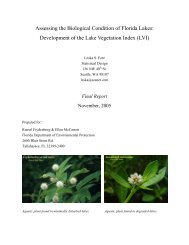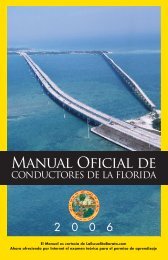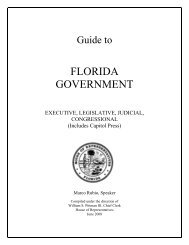Version A final setup - Florida House of Representatives
Version A final setup - Florida House of Representatives
Version A final setup - Florida House of Representatives
You also want an ePaper? Increase the reach of your titles
YUMPU automatically turns print PDFs into web optimized ePapers that Google loves.
ARTICLE V CONSTITUTION OF THE STATE OF FLORIDA ARTICLE V<br />
shall hold <strong>of</strong>fice during the pleasure <strong>of</strong> the court<br />
and perform such duties as the court directs.<br />
Their compensation shall be fixed by general<br />
law. The marshal shall have the power to<br />
execute the process <strong>of</strong> the court throughout<br />
the state, and in any county may deputize the<br />
sheriff or a deputy sheriff for such purpose.<br />
History.—S.J.R. 52-D, 1971; adopted 1972; Am. C.S. for<br />
S.J.R.’s 49, 81, 1976; adopted 1976; Am. S.J.R. 20-C, 1979;<br />
adopted 1980; Am. H.J.R. 71, 1986; adopted 1986; Am.<br />
proposed by Constitution Revision Commission, Revision No.<br />
13, 1998, filed with the Secretary <strong>of</strong> State May 5, 1998; adopted<br />
1998.<br />
SECTION 4. District courts <strong>of</strong> appeal.—<br />
(a) ORGANIZATION.—There shall be a district<br />
court <strong>of</strong> appeal serving each appellate<br />
district. Each district court <strong>of</strong> appeal shall consist<br />
<strong>of</strong> at least three judges. Three judges shall<br />
consider each case and the concurrence <strong>of</strong><br />
two shall be necessary to a decision.<br />
(b) JURISDICTION.—<br />
(1) District courts <strong>of</strong> appeal shall have<br />
jurisdiction to hear appeals, that may be taken<br />
as a matter <strong>of</strong> right, from <strong>final</strong> judgments or<br />
orders <strong>of</strong> trial courts, including those entered on<br />
review <strong>of</strong> administrative action, not directly<br />
appealable to the supreme court or a circuit<br />
court. They may review interlocutory orders in<br />
such cases to the extent provided by rules<br />
adopted by the supreme court.<br />
(2) District courts <strong>of</strong> appeal shall have the<br />
power <strong>of</strong> direct review <strong>of</strong> administrative action,<br />
as prescribed by general law.<br />
(3) A district court <strong>of</strong> appeal or any judge<br />
there<strong>of</strong> may issue writs <strong>of</strong> habeas corpus<br />
returnable before the court or any judge there<strong>of</strong><br />
or before any circuit judge within the territorial<br />
jurisdiction <strong>of</strong> the court. A district court <strong>of</strong> appeal<br />
may issue writs <strong>of</strong> mandamus, certiorari, prohibition,<br />
quo warranto, and other writs necessary to<br />
the complete exercise <strong>of</strong> its jurisdiction. To the<br />
extent necessary to dispose <strong>of</strong> all issues in a<br />
cause properly before it, a district court <strong>of</strong> appeal<br />
may exercise any <strong>of</strong> the appellate jurisdiction <strong>of</strong><br />
the circuit courts.<br />
(c) CLERKS AND MARSHALS.—Each district<br />
court <strong>of</strong> appeal shall appoint a clerk and a<br />
marshal who shall hold <strong>of</strong>fice during the pleasure<br />
<strong>of</strong> the court and perform such duties as the court<br />
directs. Their compensation shall be fixed by<br />
general law. The marshal shall have the power to<br />
execute the process <strong>of</strong> the court throughout the<br />
territorial jurisdiction <strong>of</strong> the court, and in any<br />
county may deputize the sheriff or a deputy<br />
sheriff for such purpose.<br />
History.—S.J.R. 52-D, 1971; adopted 1972.<br />
B–20<br />
SECTION 5. Circuit courts.—<br />
(a) ORGANIZATION.—There shall be a circuit<br />
court serving each judicial circuit.<br />
(b) JURISDICTION.—The circuit courts<br />
shall have original jurisdiction not vested in the<br />
county courts, and jurisdiction <strong>of</strong> appeals when<br />
provided by general law. They shall have the<br />
power to issue writs <strong>of</strong> mandamus, quo warranto,<br />
certiorari, prohibition and habeas corpus, and all<br />
writs necessary or proper to the complete<br />
exercise <strong>of</strong> their jurisdiction. Jurisdiction <strong>of</strong> the<br />
circuit court shall be uniform throughout the<br />
state. They shall have the power <strong>of</strong> direct review<br />
<strong>of</strong> administrative action prescribed by general<br />
law.<br />
History.—S.J.R. 52-D, 1971; adopted 1972.<br />
SECTION 6. County courts.—<br />
(a) ORGANIZATION.—There shall be a<br />
county court in each county. There shall be<br />
one or more judges for each county court as<br />
prescribed by general law.<br />
(b) JURISDICTION.—The county courts<br />
shall exercise the jurisdiction prescribed by<br />
general law. Such jurisdiction shall be uniform<br />
throughout the state.<br />
History.—S.J.R. 52-D, 1971; adopted 1972.<br />
SECTION 7. Specialized divisions.—All<br />
courts except the supreme court may sit in<br />
divisions as may be established by general<br />
law. A circuit or county court may hold civil and<br />
criminal trials and hearings in any place within<br />
the territorial jurisdiction <strong>of</strong> the court as designated<br />
by the chief judge <strong>of</strong> the circuit.<br />
History.—S.J.R. 52-D, 1971; adopted 1972.<br />
SECTION 8. Eligibility.—No person shall<br />
be eligible for <strong>of</strong>fice <strong>of</strong> justice or judge <strong>of</strong> any<br />
court unless the person is an elector <strong>of</strong> the state<br />
and resides in the territorial jurisdiction <strong>of</strong> the<br />
court. No justice or judge shall serve after<br />
attaining the age <strong>of</strong> seventy years except upon<br />
temporary assignment or to complete a term,<br />
one-half <strong>of</strong> which has been served. No person is<br />
eligible for the <strong>of</strong>fice <strong>of</strong> justice <strong>of</strong> the supreme<br />
court or judge <strong>of</strong> a district court <strong>of</strong> appeal unless<br />
the person is, and has been for the preceding ten<br />
years, a member <strong>of</strong> the bar <strong>of</strong> <strong>Florida</strong>. No person<br />
is eligible for the <strong>of</strong>fice <strong>of</strong> circuit judge unless the<br />
person is, and has been for the preceding five<br />
years, a member <strong>of</strong> the bar <strong>of</strong> <strong>Florida</strong>. Unless<br />
otherwise provided by general law, no person is<br />
eligible for the <strong>of</strong>fice <strong>of</strong> county court judge unless<br />
the person is, and has been for the preceding five<br />
years, a member <strong>of</strong> the bar <strong>of</strong> <strong>Florida</strong>. Unless<br />
otherwise provided by general law, a person<br />
shall be eligible for election or appointment to the<br />
<strong>of</strong>fice <strong>of</strong> county court judge in a county having a
















